|
|
|
Sort Order |
|
|
|
Items / Page
|
|
|
|
|
|
|
| Srl | Item |
| 1 |
ID:
088307
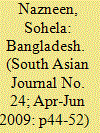

|
|
|
|
|
| Publication |
2009.
|
| Summary/Abstract |
Jamaat has taken a more comprehensive view of women's empowerment compare to the centrist parties.
|
|
|
|
|
|
|
|
|
|
|
|
|
|
|
|
| 2 |
ID:
086011


|
|
|
|
|
| Publication |
2009.
|
| Summary/Abstract |
'Women's empowerment', as used by international development organisations, is a fuzzy concept. Historical textual analysis and interviews with officials in development agencies reveal its adaptability and capacity to carry multiple meanings that variously wax and wane in their discursive influence. Today a privileging of instrumentalist meanings of empowerment associated with efficiency and growth are crowding out more socially transformative meanings associated with rights and collective action. In their efforts to make headway in what has become an unfavourable policy environment, officials in development agencies with a commitment to a broader social change agenda juggle these different meanings, strategically exploiting the concept's polysemic nature to keep that agenda alive. We argue for a politics of solidarity between such officials and feminist activists. We encourage the latter to challenge the prevailing instrumentalist discourse of empowerment with a clear, well articulated call for social transformation, while alerting them to how those with the same agenda within international development agencies may well be choosing their words with care, even if what they say appears fuzzy.
|
|
|
|
|
|
|
|
|
|
|
|
|
|
|
|
| 3 |
ID:
118019
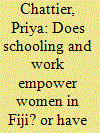

|
|
|
|
|
| Publication |
2013.
|
| Summary/Abstract |
The paper explores the limitations of the theoretical presumptions underlying the relationship between empowerment, education and employment that have been emphasized in both the existing literature and the current rhetoric to 'empower' women in developing countries. The research uses findings from in-depth interviews and focused group discussion data to empirically examine the relationship between schooling, paid work and empowerment of women in Fiji. The paper argues that the relationship between education, work and empowerment is conditioned by gender norms surrounding women's and men's choices on key economic decisions. The findings demonstrate that cultural norms about gender roles are considered to persist, generating gender inequality despite women's and girl's education and employment. Empirical evidence makes a strong case for the need to move away from broad-based conceptualizations of women's empowerment to an analysis of the social construction of gender as both a conceptual and an empirical category of inquiry.
|
|
|
|
|
|
|
|
|
|
|
|
|
|
|
|
| 4 |
ID:
128529
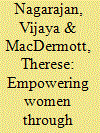

|
|
|
|
|
| Publication |
2013.
|
| Summary/Abstract |
Although the pluralist system of land tenure in Vanuatu does not directly discriminate against women, the operation of the system and contemporary interpretations of custom is increasingly marginalising women from the decision making processes regarding land management and control. Commitment to the principles of gender equality through constitutional guarantees and the ratification of relevant international treaty obligations, while providing a relevant legal framework for equality, have only had limited success in addressing discriminatory practices. This article analyses alternative ways to overcome the barriers faced by women that are currently under consideration in many Pacific island Countries, including recording and registration, as well as legal vehicles such as incorporating customary land groups, trusts and community companies. This article concludes that while both existing and proposed mechanisms have the potential to secure for women a greater role in decision making processes regarding land management and control, that potential will not be realised in the absence of knowledge, empowerment and the acceptance of the legitimacy of such rights
|
|
|
|
|
|
|
|
|
|
|
|
|
|
|
|
| 5 |
ID:
107483
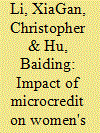

|
|
|
|
|
| Publication |
2011.
|
| Summary/Abstract |
The impact of microcredit on women's empowerment remains controversial, as documented in the microfinance literature. While some studies claim that microcredit helps women increase their income earning abilities, leading to greater power to overcome cultural asymmetries, others contend that small loans allocated to women are usually controlled by their spouses, which results in more severe subordination of women and leaves them more vulnerable to the patriarchy system within the household and/or at society level. This paper evaluates the empowerment impact of microcredit on rural women in China. Logistic regression is employed for empirical analysis and data are collected through a rural household survey. The results confirm that microcredit has a significant impact on five dimensions of women's empowerment, ranging from economic security to awareness of social/legal issues.
|
|
|
|
|
|
|
|
|
|
|
|
|
|
|
|
| 6 |
ID:
170267


|
|
|
|
|
| Summary/Abstract |
Employment and work surveys in Nepal have shown a high concentration of women in certain occupations, being flexible, low paid and requiring low skill. In the far-western region (Jumla District, Karnali Zone), the Government of Nepal provides employment to women and men through a public works programme, the Karnali Employment Programme (KEP). This paper assesses the empowerment potential of the KEP and similar employment programmes, and questions whether paid work leads to economic empowerment for women. It provides a glimpse into work patterns in low-income families in Nepal, and juxtaposes the goal of women's economic empowerment through entry into the labour market with their lived realities and needs. The paper uses ILO's Decent Work framework to argue that two key aspects are critical for women's empowerment through paid work: firstly, quality; and secondly, a positive balance between paid work, unpaid work and care work.
|
|
|
|
|
|
|
|
|
|
|
|
|
|
|
|
| 7 |
ID:
127649


|
|
|
|
|
| Publication |
2014.
|
| Summary/Abstract |
Development is conventionally understood in various ways including economic growth, increase of gross domestic product (GDP), rise of per-capita income, improvement of social facilities, political stabilities, and women's empowerment and many other issues, but it finally means bringing positive changes in the life of people. However, development is always contextual because the notion and nature of development often varies from society to society depending on the context of local-societal dynamics. Therefore what is regarded globally accepted model of development can be challenged by the local discourse of development, since local-level perception could contest the universal model. This article addresses such a case of development which is conceptualised from the social and cultural point of view amid everyday experiences of ordinary people's lives. The article contextualises its argument with specific reference to the Khumi people living in the Chittagong Hill Tracts of Bangladesh.
|
|
|
|
|
|
|
|
|
|
|
|
|
|
|
|
| 8 |
ID:
097782
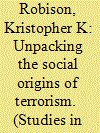

|
|
|
|
|
| Publication |
2010.
|
| Summary/Abstract |
The author's prior cross-national research found a negative relationship between the percent of the workforce that is female and terrorism. One explanation of this finding suggests that women are violence-averse and work to mitigate acts of political violence. Alternatively, women in the workforce may simply proxy for an economy with robust employment with fewer grievances or proxy for modernizing forces (e.g., democracy, secularism) that moderate traditionalism. The author examines the relationship between women in the workforce and terrorism and finds that while modernization factors are important, terrorism is nonetheless explained by the unique nonviolent influences of women in public society.
|
|
|
|
|
|
|
|
|
|
|
|
|
|
|
|
| 9 |
ID:
130504
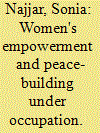

|
|
|
|
|
| Publication |
2011.
|
| Summary/Abstract |
As a contribution to the discussion on women's empowerment in the Palestine-Israel Journal, this article reflects on the possibilities for women's empowerment and peace-building under a condition of prolonged occupation. Specifically, it focuses on the near-impossibility of the manifestation of empowerment and peace for those who have been disenfranchised under a paradigm of extreme oppression in the context of Occupied Palestine. If one uses Eileen Kuttab's contextualization of Palestinian empowerment as historically being embodied in practices of mobilization and resistance, then being allowed neither mobility nor the right to organize resistance to Israeli military violence makes it clear that the prospects for successful peace-building and the realization of Palestinian women's empowerment face significant obstacles.1 This is a result of the autocratic imbalance of power that has seeped from external into internal dynamics. The external factors are the architects and participants of the occupation comprised of an illegal Israeli military occupation force of women and men, abetted by an international community that does not adhere to its mandates to the fullest extent and follows an aid praxis that further serves to annihilate mobilization and resistance. The internal obstacles to women's empowerment are an extension of the external, that is, elements of the Palestinian local governing structure that was meant to be temporary in nature.
|
|
|
|
|
|
|
|
|
|
|
|
|
|
|
|
| 10 |
ID:
169639


|
|
|
|
|
|
|
|